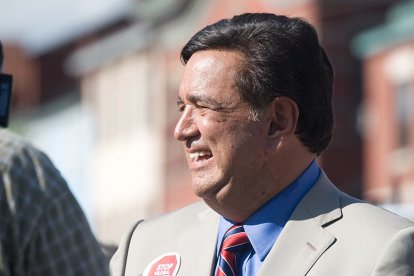Bill Richardson, former governor of New Mexico and ambassador to the United Nations, dies at 75
The politician dedicated his career to freeing Americans detained abroad. He was nominated for the Nobel Peace Prize.

Bill Richardson/Wikimedia Commons
Bill Richardson, the former Democratic governor of New Mexico, has died at age 75. He had an extensive political career. He was elected to Congress and later held several positions in Bill Clinton's cabinet, which he interspersed with private diplomacy to free Americans detained abroad. He defined himself as an "informal undersecretary for thugs." He was recently nominated for the Nobel Peace Prize.
The Richardson Center for Global Engagement, an institution he founded and led for many years, announced his passing. “He lived his entire life in the service of others — including both his time in government and his subsequent career helping to free people held hostage or wrongfully detained abroad," said Mickey Bergman, vice president of the center.
"There was no person that Gov. Richardson would not speak with if it held the promise of returning a person to freedom. The world has lost a champion for those held unjustly abroad and I have lost a mentor and a dear friend,” he added.
Born in California in 1947, he grew up in Mexico with his family, who then sent him to the United States to finish his schooling. He loved baseball. He graduated in 1970 from Tufts University (Massachusetts), where he earned a degree in French and political science.
Political career
After leaving college, he got started in politics by working for Republican Congressman Bradford Morse, Later, he worked for Henry Kissinger’s state department. By 1980, he moved to New Mexico, where he ran for Congress for the first time. After his first unsuccessful campaign, he ran again two years later and was elected.
He remained in the House until 1997, when President Clinton asked him to serve as ambassador to the United Nations, a position he held until 1998, when he became Secretary of Energy. He remained there until the end of Clinton’s term. After, he was elected governor of New Mexico.
He was elected in the 2002 election, defeating his Republican opponent by more than 14 percentage points. His popularity helped him get reelected in 2006 with the highest percentage of votes in the history of the state. Throughout his time in office, both Democrats and Republicans accused him of having a rather direct and sometimes aggressive style of expressing himself.
"Admittedly, I am aggressive. I use the bully pulpit of the governorship. But I don't threaten retribution. They say I am a vindictive person. I just don't believe that." Richardson said.
In 2008, he tried to become the first president of Hispanic origin in U.S. history. He announced his candidacy as a Democrat in January 2007 in a speech in Los Angeles. "The United States faces huge challenges, but also huge opportunities. I am running for president because these times call for a leader with a proven track record, and a demonstrated ability to bring people together to tackle our problems at home and abroad, I am that person, not because I say so, but because of what I have done, and what I can do for the American people," he said in his announcement.
Hillary Clinton, Barack Obama and John Edwards were ahead of him in the New Hampshire primary, which led him to end his campaign and his presidential aspirations. He was on Obama’s shortlist for vice president, but the then-senator ended up opting for Joe Biden.
The "informal undersecretary for thugs"
Along with public service, Richardson devoted much of his time to private diplomacy, with the aim of freeing Americans detained abroad. In effect, he negotiated the release of hostages and U.S. military personnel in Cuba, Sudan, North Korea and Iraq, even meeting with Saddam Hussein in the process. This role led him to define himself as "the informal undersecretary for thugs."
That calling led him to found the Richardson Center for Global Engagement in 2011, which worked with more than 80 million families, providing support and guidance while their loved ones were detained abroad.












